If you’re considering hiring an enterprise SEO agency, you need to understand what you’re getting into. In this post, we’ll explain what enterprise SEO is, why enterprise SEO is important, what enterprise SEO agencies do, and how to choose a reputable agency if you decide to hire one. Let’s take a closer look.

What is Enterprise SEO?
An enterprise site can be classified as a large network of websites that represent different divisions, departments, locations, and more. Enterprise sites are usually owned by big companies with thousands of websites, firm brand guidelines, and big reputations.
Enterprise SEO is a robust and highly strategic search engine optimisation strategy for enterprise sites. Yes, all SEO requires some level of strategy, but for enterprise sites, strategy is everything because a lot is at stake.
Let’s say Example Company Enterprises (ECE) is preparing to refresh its current approach to SEO, so they hire an agency to help them. ECE has 4 global locations, 6 separate divisions, 5 regional sites, and hundreds of employees and customers across the globe that will be impacted by all website updates.
In this example, the company has many different business aspects to keep in mind when creating its strategy. To develop the best possible strategy for enterprise companies like ECE, an enterprise SEO agency should consider these questions.
- Is this strategy scalable?
- What processes can be automated?
- How will this impact workflows?
- Where can templates be created?
- Who needs to be trained?
- How will metrics be reported?
Let’s take a closer look at these.
Is This Strategy Scalable?
Scalability measures how possible it’s to replicate actions at a larger scale. An SEO strategy that is scalable for a small business and a strategy that’s scalable for an enterprise business won’t be the same.
Building links, consolidating sub-pages, revamping site design, and more for 1 website is no easy task and that work increases exponentially for enterprise companies with an abundant network of websites, employees, and clients.
So, if your enterprise company is considering hiring an SEO agency here are some tips for creating a scalable plan:
- Metrics Matter: Measure success and implement strategies for reporting data.
- Find It & Fix It: If you notice a broken process, fix it immediately – don’t wait for things to go wrong down the line.
- Breakthrough: A company will grow at its own pace, and it’s important to know when it’s time to level up and break through to another level or when it’s time to wait. Growth is exciting, but don’t get carried away.
- Give It Time: New processes take time to implement, so be patient. Observe with a keen eye for detail. Review what is working well and what could be improved.
The ultimate goal is to make sure your strategy can be scaled to the level you need it to be.
What Processes Can Be Automated?
To improve scalability, automation is necessary. There are many ways to implement process automation while maintaining quality communication.
Sometimes automation is feared because of quality control. We’ve all received automated spam emails that try too hard to be personal, have grammar and sentence flow errors, and all-around miss the mark. In those instances automation isn’t adding value to the email marketing optimisation strategy, instead, it’s diminishing the user experience.
Automation can be helpful when used appropriately and with some checks and balances in place. Here are some ways an enterprise SEO strategy can utilize automation.
- Reporting
- Customer Satisfaction Emails
- Email Marketing
- Employee Onboarding
- Social Media Management
More categories could have been added to the list, but you get the picture. Many business processes can be automated.
Automation improves efficiency, standardisation, customer satisfaction, employee satisfaction, consistency in the brand presence, and more. Processes that are simple and repeatable can be automated at any time.
How Will This Impact Workflows?
When building an enterprise SEO strategy, enterprise companies have to consider their employees. All parts of the company will be affected, not just the marketing team. But how each team is affected will differ.
- IT – Coding is at the foundation of SEO. Ensure your IT team understands the scope of any SEO project like page redirects, h1 tags, font size, etc. by making a list of SEO requirements.
- Marketing – This team of creatives knows the power of quality content. SEO strategies like link-building, keyword phrases, competitive analysis, and more are essential for success.
- Sales – No one knows more about what your customers want than the Sales team, so don’t let this resource go to waste. Schedule meetings and collect knowledge that will help improve the user experience.
- Public Relations – PR wants to get the word out about your company, and that is the ultimate goal of SEO. Discuss how the PR teams press releases, product launches, and other digital marketing outreach will drive organic traffic.
- C-Suite – Company reputation and CEO reputation go hand in hand. As SEO strategies are implemented, their success (or failure) will have a direct impact on individuals in the C-Suite.
Just make sure that everyone has adequate training and is briefed on what changes are to be expected and how those changes could affect their role.
Where Can Templates Be Created?
Templates increase productivity because they make tasks repeatable, have a consistent structure, and keep different teams aligned.
Repeatable tasks like monthly reporting are made easier with templates. This way anyone on a team can complete the task, like creating a slide to report once they understand the template. Keeping a consistent structure makes it easier to spot key information. This applies to internal communication and external communication.
Internal Communication Template Ideas:
- Weekly Emails
- Seasonal Newsletters
- Company Press Releases
- Marketing Reports
- Meeting Slides
External Communication Template Ideas:
- Onboarding Emails
- Sales Pitch Deck
- Product Information PDFs
- Customer Satisfaction Surveys
It’s easy to make mistakes, and it’s easy to overlook important information. Templates minimize mistakes and put important information in consistent places, so time after time, team members always know where to look.
Who Needs To Be Trained?
After an enterprise SEO strategy has been created and implemented, it’s up to employees to keep the new processes going. That’s why training is so important.
Identify which teams will take on which roles. Then take a step back to look at the bigger picture and identify how individual teams will collaborate with each other in the workflow.
Managing multiple websites, keeping brand guidelines consistent, working with multiple teams to meet different strategic goals and objectives, and more are required to successfully maintain healthy SEO. So, ensure your teams are trained and that training is easily accessible to anyone who needs it.
How Will Metrics Be Reported?
It’s best to automate the reporting process. First, determine how reports will be downloaded and presented. To automate this, simply schedule a time reports will be automatically downloaded or schedule a time each month to download and prepare reports for presentation.
Automation is vital for reporting in the enterprise SEO space. Different teams in different locations are all working together each day and everyone has to use their time wisely. It’s best practice to review reports before presenting them during team meetings.
Each team member does not need to report every single detail, instead, create templates with outlines of the necessary information for a specific meeting. Make the full report available to anyone who wants to review it, but focus on the key metrics during presentations.
Reporting plays a big part in how enterprise businesses review and set new goals for the next month, quarter, or year.
Why is Enterprise SEO Important?
Enterprise SEO is more robust than typical SEO strategies and for enterprise companies it’s an important part of brand recognition, aligning brand voice across multiple sites, protecting brand reputation, managing internal collaboration, and standing out from competitors.
- Brand Recognition: Brand awareness or brand recognition is where it all begins. Brand recognition for enterprise companies leads to brand trust and then to loyalty. A good enterprise SEO outline encompasses all aspects of brand recognition, so the enterprise company can dominate in its business category. This is done through keyword targeting, long-tail keywords, thought leadership in blog posts, intentional social media posts, and more. Enterprise SEO impacts market share, customer acquisition costs, public relations, and more. Brand recognition is just the tip of the iceberg.
- Aligning Brand Voice Across Multiple Sites: To build brand recognition, companies must have a consistent brand voice across all web pages in their network. An enterprise SEO strategy requires establishing detailed brand guidelines that are strictly followed across all websites. If ECE has 4 divisions: food ingredients, pet food, sports nutrition, and medical foods. The first two divisions are B2B (food ingredients and pet food). The last two divisions are B2C (sports nutrition and medical foods). The tone for their B2B pages will be different from their B2C pages, but all pages should embody the company brand guidelines. These guidelines include basic things like colours, webpage formats or templates, fonts, etc. Creating processes for updating pages with new content, creating new pages, establishing workflows and cross-functional collaboration will be important for long-term success. Additionally, outsourcing aspects of the enterprise SEO strategy to a digital marketing agency can further enhance effectiveness and efficiency.
- Protecting Brand Reputation: Most enterprise companies already have an established reputation. This reputation will be affected by any SEO strategy. Brand reputation is closely linked to CEO reputation, Customer Acquisition Costs and more. So, how do you create an enterprise-level SEO strategy that protects or enhances brand reputation?
- Define the company’s brand journey. One way to do this is to feature important milestones in a timeline on the company ‘About’ page.
- Build trust with a brand’s voice. Utilize social media, blogs, and other outlets to encourage new and existing clients to trust in the quality, experience, and expertise of the brand.
- Create a plan for responding to future reputation crises.
On the ‘Our Team’ page on our site, we share a little about our mission and include a detailed timeline of our company history. The screenshot below shows how we mention our brand journey in the mission section. This is just one way we implement this best practice for brand reputation.
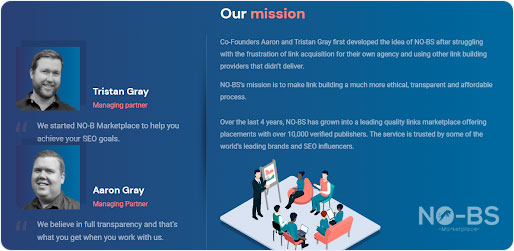
- Managing Internal Collaboration: This goes back to training and workflow planning. Managing internal collaboration requires determining which employees or teams will have certain access levels, regular reporting and communication around data and metrics, workflows for page updates or creating new pages, and more. Some aspects of internal collaboration are straightforward. In the example below, the public relations team creates press releases. The SEO specialists optimise the language in the press release. The IT team uploads the press release to the website. The marketing team creates content related to the press release. And so on.

Other aspects of internal collaboration for enterprise SEO are less straightforward. This is why it’s important to create a strategy that encompasses all parts of the SEO process. Ensure the internal collaboration strategy is scalable, repeatable, and able to evolve with the company.
- Stand Out From Competitors: Enterprise companies are working with customers at all stages in their journey, so an enterprise SEO strategy needs to speak to customers who are just becoming aware of the brand, beginning to trust the brand, and who are already loyal, so they can stand out from competitors. Performing a competitor analysis is a great way to stay aware of what other businesses are doing. To perform a competitor analysis first determine which major industries the enterprise company does business in. Then find the companies that are directly comparable and review what strategies and tactics they’ve tried. In a crowded niche, it’s important to stand out because there are so many other options for potential customers to try. In a less crowded niche, it’s easier to stand out, but no matter the number of competitors in the marketplace, the best way to stand out is to make it clear how the company is unique through brand voice, thought leadership, and consistency across all web pages.
What Does an Enterprise SEO Agency Do?
Essentially enterprise SEO agencies do the same things other SEO agencies do, but on a much larger scale with a robust team that’s dedicated to the project for the long term. A reputable agency will provide strategy documents, content creation, and link-building.
Learn more about how our team can support your SEO needs.
Strategy Documents
1. Technical SEO Audit
A technical SEO audit is the foundation of an enterprise SEO strategy because it assesses the health of an enterprise company’s websites. This assessment helps to identify where there are opportunities for improvement, what’s currently working, and what should be archived.
Some things to consider in a technical SEO audit for enterprise-level companies:
- How many websites are in the scope of the SEO project?
- What content is obsolete and can be archived?
- What pages should be updated?
- What new pages need to be created?
- Is there an existing internal linking strategy?
Answering these questions will help decide whether you need to hire an SEO agency for Enterprise SEO.
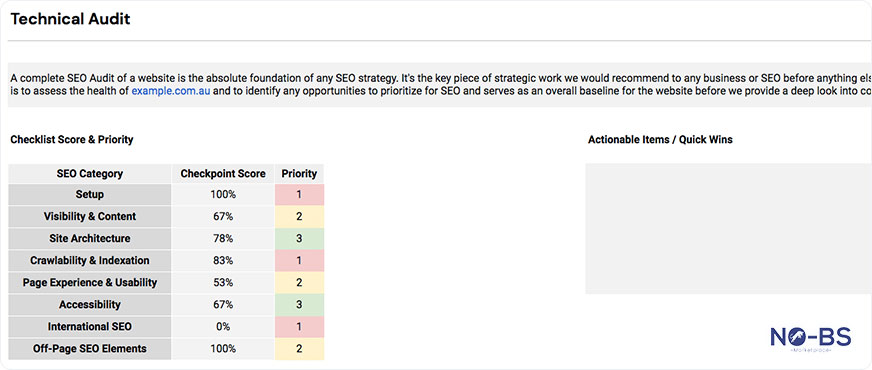
2. E.A.T Audit
E.A.T stands for expertise, authoritativeness, and trustworthiness. The E.A.T guidelines are factors Google and other search engines take into account when crawling websites and indexing information. An E.A.T audit reviews how Google sees an enterprise site and proposes ideas to improve a brand’s expertise, authoritativeness, and trustworthiness.
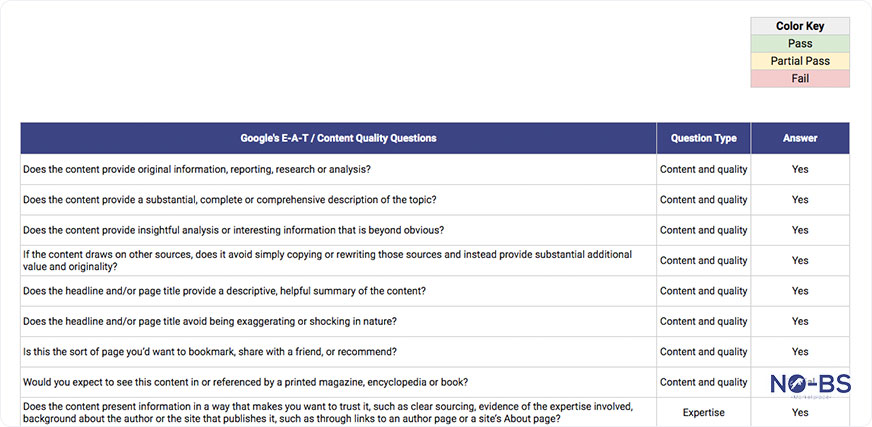
3. Keyword & Audience Research
To enhance brand visibility and improve lead growth the enterprise SEO agency will create a report that lists some topic keywords and topic clusters based on the company website and the keywords that rank for their competitors.
Extensive audience research allows the SEO team to create detailed avatars for customers that give a 360-degree view of each one and their individual demographics.
Keywords, topic clusters, and audience research come together to create a foundation for a powerful content strategy.
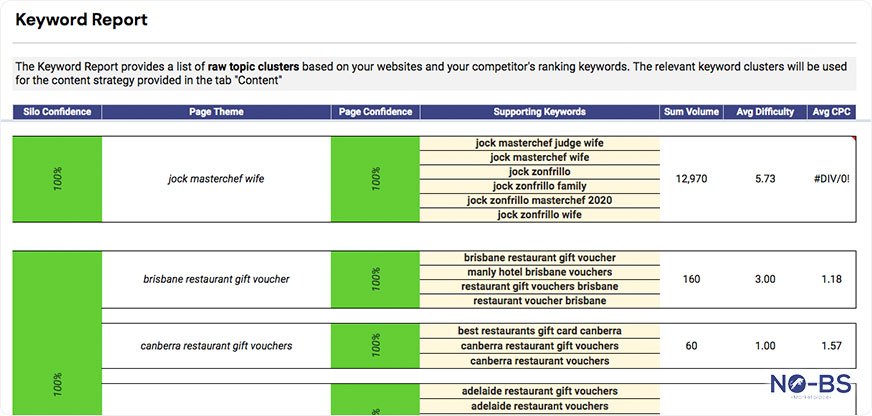
4. Competitive Analysis
Competitor analysis doesn’t stop with keyword research. This is a robust and essential part of any high-performing enterprise SEO campaign. During this phase, the enterprise SEO company is learning about the metrics of the competition. Data like visibility, backlink information, keyword ranking, are compiled and reviewed.
Typically anchor pages on an enterprise company site, like the home page, are also analysed during this process to create a complete profile of the site as a baseline for future recommendations.

5. Link-Building Strategy
A link-building strategy internally and externally is necessary for improving E.A.T. We’ve found that the pillar and cluster model is the best way to set up this strategy.
- Pillars – Pillars are broad keywords or phrases a company wants to rank high for on SERPs. These pillars act as the focus for clusters.
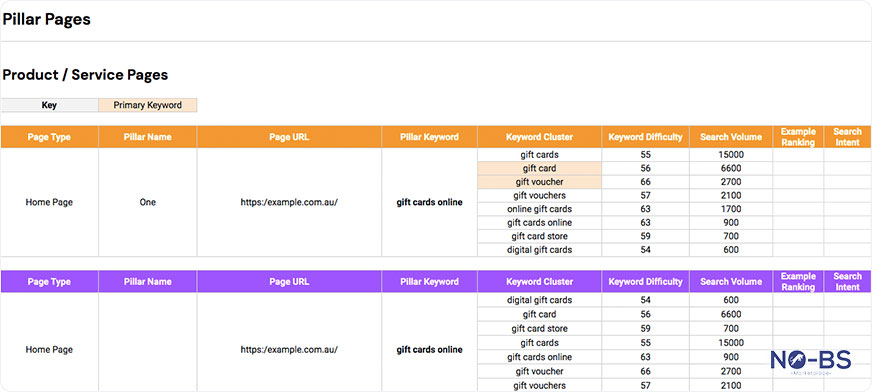
- Clusters – Clusters are specific topics that fit within the broader pillar topic. A company can have multiple clusters within a pillar

For internal content creation, the pillar and cluster model can be a way to inspire internal linking by naturally grouping related content together and linking them to each other through anchored text or a related links section.
For external content creation, this model allows the enterprise company to build valuable backlinks that enhance brand and page authority. It can also act as a funnel to sales content.
6. Content Creation
Content creation for an enterprise SEO strategy requires a team of dedicated writers and creators and an outline of the pillar and cluster model that the content is being based on. Take a look at the example below of a pillar and cluster model.
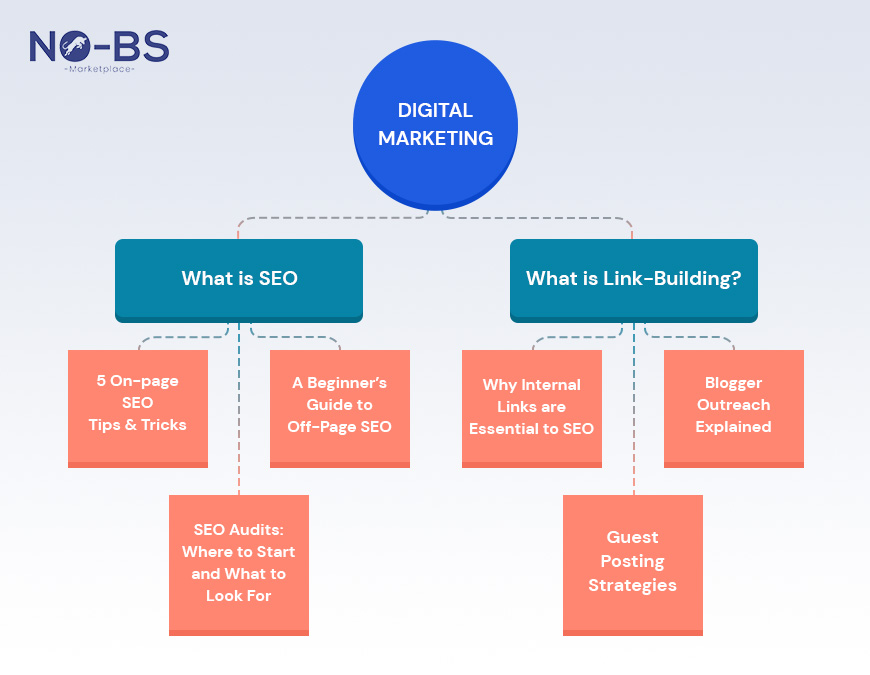
Let’s examine the left side. Digital Marketing is the pillar topic at the top. The cluster is ‘What is SEO?’ in the middle. Within that cluster are 3 sample content topics in dark blue. Each of those topics could be blog posts, videos, PDFs, and more. It’s best practice to continue to build out clusters and content topics to create a wide net of ideas.
Then it’s time to hit the ground running. Large amounts of unique, relevant, and high-quality content are created by following E.A.T guidelines and maintaining SEO requirements.
7. SEO Strategy Implementation
Content creation is just the beginning of putting an enterprise SEO strategy into action.
- Internal Linking and Link-Building: To get the most value out of content that exists on the enterprise site, it’s important to create internal links. These are links that take page visitors from one page to another within the company’s site. As I mentioned before, this can be done through linked anchor text within blogs or a related links section at the bottom of the page. External link-building or creating backlinks is also an important part of creating value. Backlinks take page visitors from a page on a reputable publisher site to the enterprise company site. These links have a high amount of value or ‘link juice’ and the goal is to pass along as much link juice as possible from page to page within your website. Scaling this strategy to fit the needs of an enterprise company requires managing thousands of pages on multiple websites in different geographical locations and different languages, all while considering the specific content optimization channels or niches.
- Monitor Analytics. Pay close attention to key data points and changes that happen over time as a result of the SEO strategy. Track the customer journey that takes individuals from the awareness stage to trusting the brand and guides them to become loyal to the brand. What parts of that process could be optimized? Many other key data points can be tracked such as:
- Traffic or link-value created through backlinks
- Organic search traffic for keyword phrases
- Ranking on SERPs (Search Engine Results Pages)
- Change in bounce rate
- Change in sales for products, services, and other offerings
It’s also important to monitor brand reputation online across multiple platforms. Enterprise SEO companies must pay attention to how the SEO strategies are affecting brand perception.
So, How Do You Find A Reputable Enterprise SEO Agency?
Do your due diligence. Check out reviews on the enterprise SEO agency. Read their blog posts. Request to see a list of their past clients. And review anything else about the company before saying yes to purchasing their enterprise SEO services.
Keep an eye out for red flags like promises for immediate results or a one-size-fits-all approach. Promising immediate results is a red flag because it typically takes around 3-4 months to see any significant changes with SEO strategies. A one-size-fits-all approach is a red flag because each company is different and enterprise-level SEO requires creating a plan tailored to the specific goals of the enterprise company.
There are many different SEO agencies to choose from, so it’s up to you to use the knowledge you gained from this article and find the right enterprise SEO company. Should you hire an SEO Agency for Enterprise SEO? The short answer is yes depending on what your needs are.
